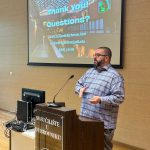Study: Active Use of News Portals Can Increase Cognitive, Psychological and Behavioral Dimensions of Civic Engagement
A new study has found that active use of news portals positively predicts online community discussion to subsequently increase cognitive, psychological and behavioral dimensions of civic engagement.
The findings by Seungahn Nah, Dianne Snedaker Professor in Media Trust and research director of the UF’s Consortium on Trust in Media and Technology, Korea University scholar Dam Hee Kim, and Joshua von Herrmann from the University of Arizona are the co-authors of “News Portals as a Gateway to Civic Engagement: The Case of South Korea” published in Media International Australia on Oct. 26.
The authors applied the communication mediation model and the communication infrastructure theory to the Korean news media environment to investigate the potential of news portals as a gateway to civic engagement through online discussion. They distinguished the active use of news portals for information about community issues and public affairs (e.g. commenting, passing along and searching for information) from the passive use of news portals (i.e. simple reception of information).
According to the authors. “An analysis of a national survey of 1,294 Korean adults shows that active, not passive, use of news portals positively predicts online community discussion to subsequently increase cognitive, psychological, and behavioral dimensions of civic engagement: neighborhood belonging, collective efficacy, and civic participation. Importantly, active portal use’s indirect positive relationship with civic engagement through online community discussion is stronger among people with higher news portal credibility.”
Category: College News, Trust News
Tagged: Consortium on Trust in Media and Technology Dianne Snedaker Professor in Media Trust Media International Australia News Portals Seungahn Nah
Subscribe to our News Digest


